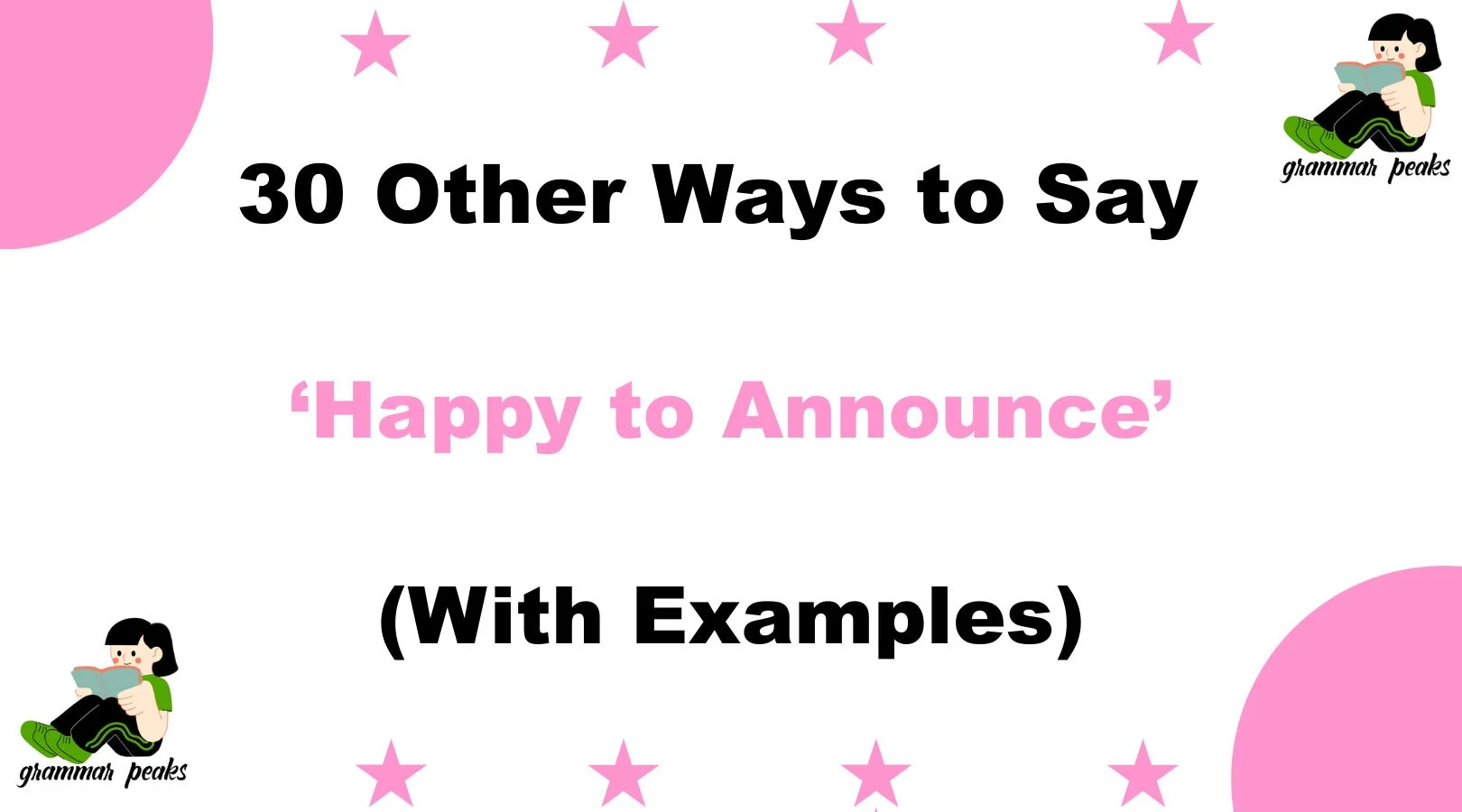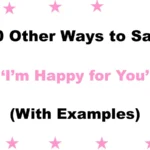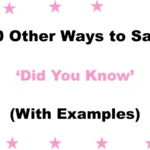In both professional and personal communication, the words we choose carry weight. Saying “Happy to announce” is common—but sometimes, it can feel overused or generic. Whether you’re launching a product, celebrating a milestone, or sharing a life update, using a more thoughtful or expressive phrase can make your message feel warmer and more sincere.
This article offers 30 fresh, heartfelt, and versatile alternatives to help your announcements feel more genuine, polished, and engaging. Each option is explained with examples, tones, and usage tips to guide you in using them effectively.
What Does “Happy to Announce” Mean?
The phrase “happy to announce” is a commonly used expression that conveys excitement, joy, or pride when sharing news or updates—whether in a personal or professional context. It signals that the speaker feels positive and enthusiastic about what they are about to reveal, such as a new job, product launch, event, or achievement.
When to Use “Happy to Announce”
Use “happy to announce” when you want to express excitement or gratitude for a particular milestone, achievement, or piece of news. It works well in:
- Company updates
- Event promotions
- Social media celebrations
- Emails or press releases
- Team recognitions
It’s a reliable default—but if you want your words to be more personalized or emotionally nuanced, consider one of the alternatives below.
Is It Professional/Polite to Say “Happy to Announce”?
Yes, “happy to announce” is both professional and polite in most contexts. It’s widely accepted in emails, presentations, LinkedIn posts, and press statements. However, it can feel cliché or formulaic, especially in industries that value creative or brand-specific language. To make your communication stand out, try a synonym that’s tailored to your tone, audience, or message.
Pros and Cons of Saying “Happy to Announce”
Pros:
- Clear and widely understood
- Professional and appropriate
- Sets a positive tone instantly
Cons:
- Overused and predictable
- May feel impersonal or robotic
- Lacks emotional nuance or creativity
Synonyms for “Happy to Announce”
- Thrilled to Share
- Excited to Reveal
- Pleased to Announce
- Honored to Introduce
- Grateful to Present
- Proud to Share
- Overjoyed to Declare
- Delighted to Share
- Elated to Report
- Ecstatic to Let You Know
- Buzzing to Break the News
- Can’t Wait to Tell You
- Delighted to Inform
- With Joy, We Share
- It’s Our Pleasure to Announce
- We’re Beaming to Share
- Humbled to Share
- Pumped to Unveil
- Exhilarated to Share
- It Brings Us Great Joy to Announce
- With Great Excitement
- We’re Happy to Break the News
- We’re All Smiles to Share
- Tickled to Tell You
- With a Full Heart, We Share
- Eager to Share
- Smiling as We Say
- Feeling Grateful to Announce
- Brimming with Excitement
- Heartfelt News to Share
1. Thrilled to Share
Definition: To feel deep excitement about revealing something.
Detailed Explanation: “Thrilled to share” adds extra emotional energy and feels more expressive than “happy.”
Scenario Example: “I’m thrilled to share that I’ve joined the marketing team at XYZ Corp.”
Best Use: When you want to highlight personal or career milestones.
Worst Use: In very formal or reserved settings where strong emotion may not be appropriate.
Tone: Vibrant, excited, personal
2. Excited to Reveal
Definition: Feeling anticipation and eagerness about showing something.
Detailed Explanation: “Excited to reveal” gives a sense of build-up or surprise, perfect for launches or secrets.
Scenario Example: “We’re excited to reveal our latest design collection.”
Best Use: Product reveals, creative projects, new features
Worst Use: For serious or non-celebratory news
Tone: Energetic, engaging
3. Pleased to Announce
Definition: A more polished, professional version of “happy.”
Detailed Explanation: “Pleased” strikes a formal yet warm tone, ideal for corporate or academic updates.
Scenario Example: “I’m pleased to announce my appointment as Director of Operations.”
Best Use: Formal emails, LinkedIn posts, executive news
Worst Use: Too stiff for casual or fun updates
Tone: Professional, courteous
4. Honored to Introduce
Definition: Expressing gratitude or privilege in presenting someone/something.
Detailed Explanation: “Honored to introduce” adds a layer of respect and pride, especially when highlighting people.
Scenario Example: “We’re honored to introduce our keynote speaker, Dr. Lina Ahmed.”
Best Use: Ceremonial moments, awards, public figures
Worst Use: Personal or product updates without formal value
Tone: Respectful, sincere
5. Grateful to Present
Definition: Showing thankfulness while sharing news.
Detailed Explanation: This alternative expresses not just happiness but humility and appreciation.
Scenario Example: “I’m grateful to present my latest research on sustainable design.”
Best Use: Academic presentations, heartfelt updates
Worst Use: For marketing messages or sales
Tone: Thoughtful, humble
6.Proud to Share
Definition: Feeling deep satisfaction or pride when making an announcement.
Detailed Explanation: “Proud to share” emphasizes personal achievement or group accomplishment and adds emotional weight.
Scenario Example: “We’re proud to share our company’s first carbon-neutral report.”
Best Use: Major accomplishments, awards, milestones
Worst Use: For routine or minor updates
Tone: Confident, heartfelt
7. Overjoyed to Declare
Definition: Experiencing great happiness or elation about a piece of news.
Detailed Explanation: This phrase conveys intense joy and works well when the announcement is highly anticipated.
Scenario Example: “I’m overjoyed to declare my engagement to the love of my life.”
Best Use: Life updates, personal milestones
Worst Use: In corporate or legal documents
Tone: Emotional, joyful
8. Delighted to Share
Definition: A gentle and warm way of expressing happiness in an announcement.
Detailed Explanation: “Delighted” strikes a friendly yet elegant tone, great for social or business contexts.
Scenario Example: “I’m delighted to share that I’ll be speaking at the Global Tech Conference.”
Best Use: Professional wins, invitations, personal achievements
Worst Use: When you need more urgency or excitement
Tone: Gracious, calm, upbeat
9. Elated to Report
Definition: Extremely happy or joyful when giving an update or information.
Detailed Explanation: Adds a layer of energy and optimism to factual or formal news.
Scenario Example: “We’re elated to report our partnership with UNICEF is officially live.”
Best Use: Corporate or nonprofit news, media releases
Worst Use: For small updates or non-celebratory messages
Tone: Positive, optimistic
10. Ecstatic to Let You Know
Definition: Feeling overwhelming joy to share something exciting.
Detailed Explanation: This version is playful and very expressive, suitable for heartfelt or fun announcements.
Scenario Example: “I’m ecstatic to let you know I’ve landed my dream job!”
Best Use: Big personal wins, surprise announcements
Worst Use: In formal or corporate communications
Tone: Bubbly, celebratory
11. Buzzing to Break the News
Definition: Extremely excited, like a “buzz” of energy, about revealing something.
Detailed Explanation: A trendy and modern phrase often used on social media or in creative industries.
Scenario Example: “I’m buzzing to break the news—we’ve been nominated for an Emmy!”
Best Use: Social media, creative work, public achievements
Worst Use: In serious or solemn updates
Tone: Trendy, energetic, informal
12. Can’t Wait to Tell You
Definition: Overflowing with anticipation and eagerness to share something.
Detailed Explanation: Makes the news feel personal and emotionally charged, great for teasing excitement.
Scenario Example: “I can’t wait to tell you—we’re expecting twins!”
Best Use: Personal updates, surprise reveals
Worst Use: For formal or high-stakes business contexts
Tone: Personal, eager
13. Delighted to Inform
Definition: A more formal yet happy way to deliver news.
Detailed Explanation: “Delighted to inform” is professional, and often used in HR, academic, or medical settings.
Scenario Example: “We’re delighted to inform you that your application was successful.”
Best Use: Formal notices, client updates, applications
Worst Use: In casual or humorous messages
Tone: Respectful, polished
14. With Joy, We Share
Definition: Using emotional sincerity to introduce an announcement.
Detailed Explanation: Adds a touch of poetic sentiment, great for family, faith-based, or heartfelt messages.
Scenario Example: “With joy, we share the birth of our daughter, Noor.”
Best Use: Life events, ceremonial messages, group/family notes
Worst Use: Business or tech news
Tone: Gentle, sincere, emotional
15. It’s Our Pleasure to Announce
Definition: Expressing satisfaction or delight while sharing information.
Detailed Explanation: Adds a professional polish, perfect for joint or organizational announcements.
Scenario Example: “It’s our pleasure to announce the opening of our newest location in Dubai.”
Best Use: Company updates, client-facing news, partnerships
Worst Use: For personal, informal news
Tone: Corporate, gracious
16. We’re Beaming to Share
Definition: Visually and emotionally expressing joy or pride.
Detailed Explanation: Conveys genuine excitement with a touch of warmth, great for emotional connection.
Scenario Example: “We’re beaming to share that our little one has arrived!”
Best Use: Family updates, school or community news
Worst Use: In formal announcements or reports
Tone: Warm, loving, informal
17. Humbled to Share
Definition: Expressing gratitude and humility while making an announcement.
Detailed Explanation: Acknowledges that the news or honor is personally meaningful and not taken for granted.
Scenario Example: “I’m humbled to share that I’ve been selected for the Forbes 30 Under 30 list.”
Best Use: Personal honors, awards, service-based roles
Worst Use: For light or humorous topics
Tone: Sincere, respectful
18. Pumped to Unveil
Definition: Excited and energized to show or release something.
Detailed Explanation: Very casual and modern, used often in sports, tech, and youth culture.
Scenario Example: “We’re pumped to unveil our new e-commerce platform!”
Best Use: Tech, events, product launches
Worst Use: For serious or sensitive topics
Tone: Excited, high-energy, casual
19. Exhilarated to Share
Definition: Feeling thrilled and energetic when presenting news.
Detailed Explanation: “Exhilarated” adds an almost adrenaline-like energy, showing enthusiasm beyond the norm.
Scenario Example: “I’m exhilarated to share that I’ve signed a book deal!”
Best Use: Big wins, exciting new ventures
Worst Use: For routine or expected updates
Tone: Exuberant, vivid
20. It Brings Us Great Joy to Announce
Definition: Introducing an announcement with a formal and heartfelt touch.
Detailed Explanation: Ideal for events involving shared joy or emotional connection.
Scenario Example: “It brings us great joy to announce the engagement of our daughter.”
Best Use: Family announcements, invitations, ceremonies
Worst Use: For corporate or dry communications
Tone: Elegant, loving, classic
21. With Great Excitement
Definition: Introducing news with genuine anticipation and enthusiasm.
Detailed Explanation: This phrase builds anticipation while maintaining a tone of professionalism and warmth.
Scenario Example: “With great excitement, we introduce our summer internship program.”
Best Use: Launches, product drops, major programs
Worst Use: When announcing neutral or administrative updates
Tone: Upbeat, positive, welcoming
22. We’re Happy to Break the News
Definition: Sharing news in a way that feels fresh and current.
Detailed Explanation: This phrase feels slightly media-inspired, making it great for timely updates or public-facing news.
Scenario Example: “We’re happy to break the news—our app is now live!”
Best Use: Social media, public launches, trending updates
Worst Use: In formal or private contexts
Tone: Lively, casual, slightly playful
23. We’re All Smiles to Share
Definition: Showing visible joy or happiness while announcing something.
Detailed Explanation: A great option for announcements with an emotional or family-centered tone.
Scenario Example: “We’re all smiles to share that our wedding photos are finally here!”
Best Use: Life events, creative updates, fun team news
Worst Use: In serious or formal scenarios
Tone: Cheerful, warm, expressive
24. Tickled to Tell You
Definition: Feeling delighted in a lighthearted, playful way.
Detailed Explanation: “Tickled” adds whimsy and charm, perfect for casual updates or quirky messages.
Scenario Example: “I’m tickled to tell you—our podcast just hit 10,000 downloads!”
Best Use: Creative projects, humor-infused news
Worst Use: Corporate or serious communications
Tone: Playful, informal, cheerful
25. With a Full Heart, We Share
Definition: Announcing something with deep emotional significance.
Detailed Explanation: This phrase adds sincerity and warmth, best suited for emotional or heartfelt announcements.
Scenario Example: “With a full heart, we share the passing of our founder and mentor.”
Best Use: Tributes, memorials, family updates
Worst Use: For casual or product-related announcements
Tone: Tender, emotional, respectful
26. Eager to Share
Definition: Excited and ready to communicate something meaningful.
Detailed Explanation: A more neutral yet positive way to convey interest and enthusiasm.
Scenario Example: “We’re eager to share our latest insights in next week’s webinar.”
Best Use: Professional insights, educational content
Worst Use: For announcements that require more formality or gravity
Tone: Sincere, straightforward
27. Smiling as We Say
Definition: Conveying joy through a personal and visual touch.
Detailed Explanation: This phrase paints an image of someone genuinely smiling—making it more personal and human.
Scenario Example: “Smiling as we say—we’ve hit our 1-year business anniversary!”
Best Use: Small celebrations, milestones, team moments
Worst Use: In high-stakes professional communications
Tone: Charming, informal, genuine
28. Feeling Grateful to Announce
Definition: Combining gratitude and joy in sharing something important.
Detailed Explanation: Expresses not only happiness but also appreciation, showing humility and heart.
Scenario Example: “Feeling grateful to announce the publication of my first book.”
Best Use: Personal achievements, milestones, service roles
Worst Use: For routine or neutral business updates
Tone: Appreciative, emotional, sincere
29. Brimming with Excitement
Definition: Overflowing with positive energy and anticipation.
Detailed Explanation: Great for expressing big excitement without being too formal or stiff.
Scenario Example: “Brimming with excitement—we reveal our new product line!”
Best Use: Launch events, social media reveals, team announcements
Worst Use: In somber or toned-down scenarios
Tone: Vibrant, joyful, expressive
30. Heartfelt News to Share
Definition: An introduction to news that’s personally meaningful and sincere.
Detailed Explanation: A gentle and caring tone perfect for announcements that are intimate or emotionally heavy.
Scenario Example: “We have heartfelt news to share: our founder is retiring after 40 years.”
Best Use: Goodbyes, retirements, tributes
Worst Use: In marketing or sales
Tone:Honest, warm, introspective
Conclusion
Choosing the right phrase instead of “Happy to Announce” can bring more personality, sincerity, and meaning to your message. Whether you’re feeling thrilled, honored, or grateful, each alternative gives you a unique voice to match the tone and audience of your announcement. From professional posts to personal milestones, let your words reflect the emotion behind the moment. So the next time you’re tempted to write “happy to announce,” pause—and choose a phrase that speaks from the heart.
FAQs
1. Why should I avoid saying “Happy to Announce” too often?
While “happy to announce” is a perfectly acceptable phrase, it can become overused and predictable, especially in professional or creative spaces. Using more original, heartfelt, or audience-specific alternatives helps your message feel more authentic, engaging, and memorable.
2. Are these alternatives suitable for both professional and personal use?
Yes! Many of the phrases listed are versatile and adaptable. Some like “Pleased to announce” or “With great excitement” are ideal for professional settings, while others like “We’re all smiles to share” or “Smiling as we say” work best in personal or informal communications. Each entry includes guidance on where and when it fits best.
3. Which is the most formal alternative to “Happy to Announce”?
The most formal options are phrases like “Pleased to announce,” “It’s our pleasure to announce,” and “Delighted to inform.” These are appropriate for emails, press releases, corporate updates, or academic contexts where professionalism is key.
4. Can these alternatives improve my communication skills?
Absolutely. Expanding your vocabulary with emotionally rich alternatives helps you connect better with your audience, express sincerity, and avoid sounding robotic or repetitive. It shows attention to tone, context, and emotional impact—skills that are essential in both writing and speaking.
5. How do I choose the best alternative for my situation?
Start by considering:
- The tone you want (formal, cheerful, humble, etc.)
- The context (workplace, social media, email, family)
- The audience (colleagues, friends, clients, general public)
Then pick a phrase that reflects both your emotion and the message’s significance. If you’re unsure, opt for neutral yet sincere options like “Excited to share” or “Grateful to announce.”






